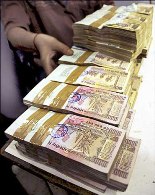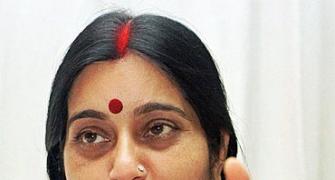 The Bharatiya Janata Party notes with dismay the fact that the consumer price inflation in India today is the highest among all the countries of Asia-Pacific.
The Bharatiya Janata Party notes with dismay the fact that the consumer price inflation in India today is the highest among all the countries of Asia-Pacific.
Prices for industrial workers shot up by 14.97 per cent in December, 2009, compared with those in December, 2008 - the highest in eleven years.
For agricultural workers, the rise during this period was 17.21 per cent. Similarly, the Wholesale Price Index shot up to 8.56 per cent in January, 2010 - the highest in 13 months.
Prices of rice and dal, wheat and other cereals, vegetables, specially onions and potatoes, edible oils and sugar, milk, kerosene, cement, steel and other building materials and fertilisers have all gone through the roof in the last few months. Tur dal has already scored a century and sugar a half century.
The UPA government had inherited a robust economy when it assumed office for the first time in May, 2004. Its own Economic Survey of July, 2004, said: "The economy appears to be in a resilient mode in terms of growth, inflation and balance of payments, a combination that offers large scope of consolidation of the growth momentum with continued macroeconomic stability."
Yet, it is this macroeconomic stability that became a casualty as a result of the mismanagement of the economy by the Congress party-led UPA government in the subsequent years. The Economic Survey of 2007-08 put it succinctly when it noted: "The decisive change in growth trend also means that the economy was, perhaps, not fully prepared for the different set of challenges that accompany fast growth."
In other words, the government of the day did not prepare the economy to face the challenges posed by faster growth. All the present ills of the economy, including the unbearable price rise, are the result of this mismanagement. The UPA government wasted the good years in just celebrating the high growth, for which it itself had done nothing and failed to put a roof over its head when the sun was shining.
So, when the rain came, it was totally unprepared for it. And all this happened under the charge of a Prime Minister whose only claim to that post is that he is a distinguished economist.
The government could not properly handle the overheating of the economy as a result of high liquidity in the system, largely contributed by foreign inflows, and the high demand generated by the high growth recorded by the economy.
It surrendered before these challenges and did what it should not have done, namely, use the hammer of monetary policy to squeeze liquidity out of the system, thereby killing both investment and consumer demand. The global financial crisis came in handy to provide a cover to the government to hide all its misdeeds. It also gave it an excuse to recklessly open its coffers in the name of a stimulus package, which was more in the nature of liberal hand-outs in an election year to subserve its narrow political interests.
It raised its budgetary deficit to unsustainable levels and had to borrow Rs 3.1 lakh crore in 2008-09 and is budgeted to borrow Rs 4.5 lakh crore in the current year, if all goes well. But clearly all is not well. Its revenue receipts are likely to be less than the budget estimates, the expected realisation of Rs 35,000 crore (Rs 350 billion) from the auction of 3G spectrum is not likely to materialise in this financial year and its expenditure may exceed the target.
The Comptroller and Auditor General has already commented adversely on the fraudulent budgetary practice of concealing the actual deficit by showing expenditure on petroleum, food and fertiliser subsidies below the line. In order to keep the deficit under control, the government has hit upon a novel idea - to change the base year, recalculate the GDP and keep the deficit low in at least optical terms.
The seats the Congress party has won in Lok Sabha have come at a huge cost to the country.
(Excerpts from the Economic Resolution of the Bharatiya Janata Party, passed by its National Council at Indore on February 18, 2010)






